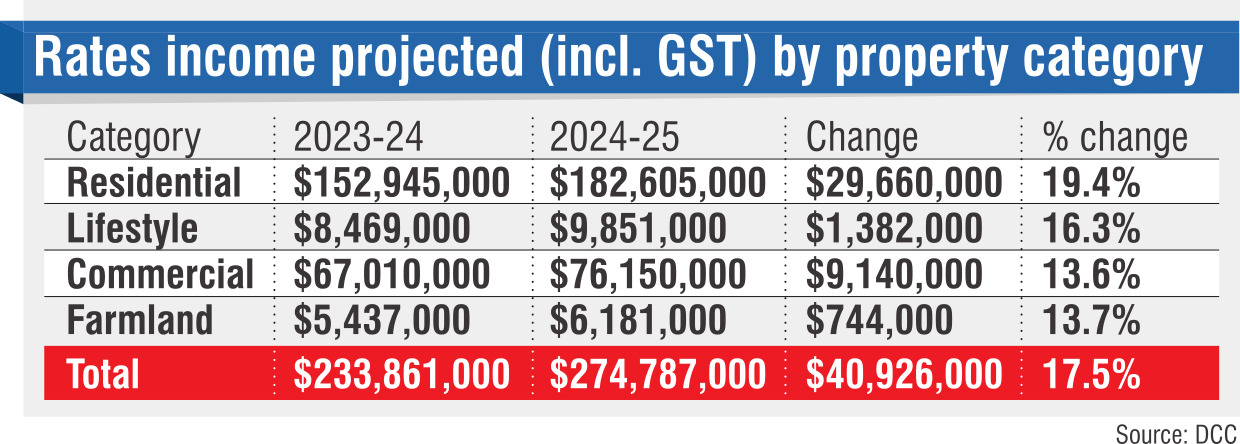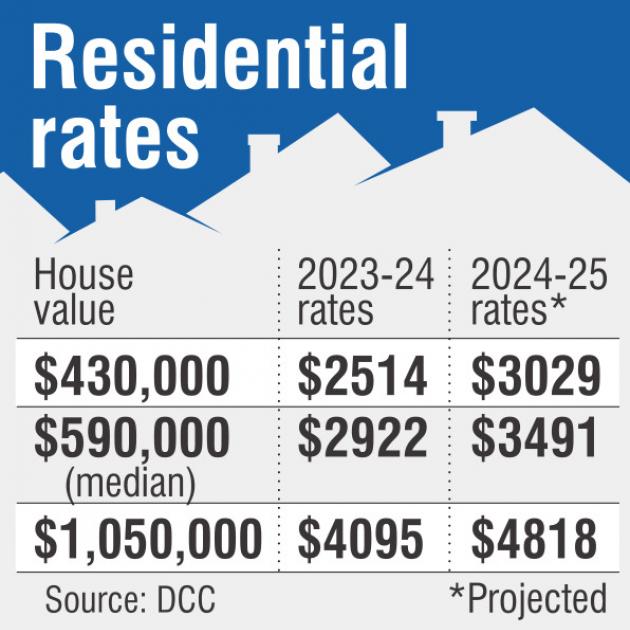
Grey Power Otago president Jo Millar said she planned to talk to city councillors directly about the indicated increase.
"We’ve got grave concerns here about how people are going to keep affording to live," she said.
"There just has to be some way we can work with the council that will allow people here to stay in their homes."
Budgets to be discussed by the Dunedin City Council next week show an overall rates increase of 17.5%.
The residential category of rates could have a 19.4% increase, while the increase could be 16.3% for lifestyle properties, 13.6% for commercial properties and 13.7% for farmland.
Dunedin Mayor Jules Radich said the city’s water infrastructure required an upgrade to plants, pipes and processes.
"Like it or not, we are going to have to pay for it ourselves and we have to get on with the job," he said.
"That adds 5.4% to rates."
A revamp of rubbish and recycling kerbside collection added 4.4% to rates.
Debt was a mounting issue.
"The rise in interest costs have added another 1.8% to Dunedin’s rates before we start to look at all the other cost pressures in our economy," Mr Radich said.
The budgets had been prepared within an economic climate of high inflation, the council said.
"Some residents will be aware that Dunedin rates are below the nationwide average and, while it is of little comfort, even after this increase I expect we will still be below the national average next year," Mr Radich said.
Mrs Millar had some sympathy for the first-term mayor and the council.
"They’ve done, I believe, a really good job at trying to curb what they can, but it’s escalating costs of everything that’s taking a lot of it out of their hands."
Mrs Millar suggested people would need assistance.
"Being told that we’re among the cheapest rates in New Zealand does nothing to help us."

Mr Collins said strategic work would be needed to ensure productivity growth followed the inflationary period.
The council projected a net deficit of more than $25 million alongside a 17.5% rates rise.
Council debt was predicted to rise to $706.5m by the end of June next year — an increase of more than $117m on the 2023-24 annual plan.
The proposed capital expenditure budget for 2024-25 was above $207m.
When the 2021-31 long-term plan was adopted, just over $157m had been provided for the fourth year’s capital spending.
The revised figure "more accurately reflects the cost and delivery phases of various projects", the council said.
The kerbside collection targeted rate is to increase from $106.10 to $301.50.
This reflects the increased costs of running a system that will no longer feature black plastic rubbish bags.
Wheelie bins will be used instead, and food scraps and garden waste will be collected separately from general rubbish from July.
It was previously indicated the flat fee for the service would be between $320 and $340 a year.
The draft budget provided for an increase of more than $2.6m for staffing costs, or 3.3%.
Negotiated salary increases were "absorbed within existing budgets" and there had been a slowdown in recruitment.
The budgeted headcount had reduced from 903 fulltime-equivalent positions to 852.
New Zealand Taxpayers’ Union spokesman Alex Murphy said the council’s level of staffing, including for its companies, was "whopping".
"As is the same with many other councils across New Zealand, Dunedin City Council has got a spending problem — not a funding problem."
— Additional reporting Hamish MacLean














